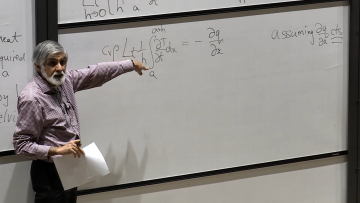Nonlinear Fokker-Planck equations modelling large networks of neurons
Sessions led by Dr Pierre Roux will take place on
30 May 2023 10:00 - 12:00 C2
6 June 2023 15:00 - 17:00 C2
8 June 2023 10:00 - 12:00 C2
13 June 2023 15:00 - 17:00 C2
Participants should have a good knowledge of Functional Analysis; basic knowledge about PDEs and distributions; and notions in probability. Should you be interested in taking part in the course, please send an email to @email.
Abstract
We will start from the description of a particle system modelling a finite size network of interacting neurons described by their voltage. After a quick description of the non-rigorous and rigorous mean-field limit results, we will do a detailed analytical study of the associated Fokker-Planck equation, which will be the occasion to introduce in context powerful general methods like the reduction to a free boundary Stefan-like problem, the relative entropy methods, the study of finite time blowup and the numerical and theoretical exploration of periodic solutions for the delayed version of the model. I will then present some variants and related models, like nonlinear kinetic Fokker-Planck equations and continuous systems of Fokker-Planck equations coupled by convolution.


